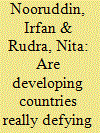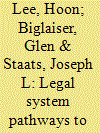|
|
|
Sort Order |
|
|
|
Items / Page
|
|
|
|
|
|
|
| Srl | Item |
| 1 |
ID:
134835


|
|
|
|
|
| Summary/Abstract |
This study evaluates the embedded liberalism hypothesis in a broad swath of less developed countries (LDCs). The authors find that LDC governments pursue a distinct welfare state policy that protects citizens from economic insecurities associated with global market expansion. Specifically, governments use public employment—and particularly employment in civil services and administration—to foster domestic stability alongside market expansion. However, such jobs are targeted to politically salient groups, not poorer groups that might also face increased economic uncertainty postopenness. In turn, public employment shores up public support for openness. The authors' findings suggest that free traders have reasons both to celebrate and to bemoan this LDC embedded liberalism compact. On the positive side, LDC governments are working hard to maintain political support for free trade; on the other hand, the compromise of protecting privileged groups at the expense of others in society raises questions about the long-term sustainability of their strategy.
|
|
|
|
|
|
|
|
|
|
|
|
|
|
|
|
| 2 |
ID:
136469


|
|
|
|
|
| Summary/Abstract |
This paper has two objectives. First, it aims to analyse how transnational agricultural traders are positioning themselves in, and capitalising on, the financialisation of agriculture. Second, it seeks to position land investments in this process. This is done by situating Cargill – one of the largest agricultural trading companies in the world – into the transformation of agriculture in the world economy and by assessing its strategies of adaption through private equity-driven land investment in the Philippines. The article notes, following Burch and Lawrence, that the transforming position of agriculture is created by reshaping relationships in the agri-food supply chain and is based on the logic of finance capital. An example of this process from the Philippines is provided, where Cargill’s private equity arm – Black River Asset Management– is investing in land through equity acquisitions of a Philippine company, Agrinurture, in a manner that allows the company to adapt to national and local dynamics. The evolving and deepening connection between finance and agriculture is presented first, followed by a discussion of how Cargill fits into this transition in the Philippine context.
|
|
|
|
|
|
|
|
|
|
|
|
|
|
|
|
| 3 |
ID:
135978


|
|
|
|
|
| Summary/Abstract |
We examine the extent to which Chinese development banks have financed the globalization of China's “national champion” firms: specifically, through outward foreign direct investment (OFDI). We create a database of Chinese finance for OFDI and compare our results to the existing literature and available data on Japan, Korea and other Asian nations. We estimate the total value of China's OFDI finance from 2002 to 2012 at US$140bn. As a percentage of total OFDI, China's lending is roughly three times higher than Japan's, the previous global leader in OFDI finance. We identify two major reasons for China's high (31 percent) ratio of OFDI lending to total OFDI. First, China has a greater incentive to give OFDI loans than Japan or Korea ever did because its borrowers are state-owned so it can more easily channel funds to targeted areas. Second, China has a greater capacity to give OFDI loans because it has significantly higher savings and foreign exchange reserves than Japan and Korea.
|
|
|
|
|
|
|
|
|
|
|
|
|
|
|
|
| 4 |
ID:
135980


|
|
|
|
|
| Summary/Abstract |
The empirical literature on China's outward foreign direct investment mainly relies on aggregate data from official statistics, but the reliability of such data is currently a matter of concern because it does not take account of relevant features such as industry breakdown, ownership structure and entry mode. A novel firm-level database, EMENDATA, compiled by matching data from several available sources on various types of cross-border deals and including information on group structure, provides a more accurate picture and enables new empirical analyses of the rapidly increasing presence of Chinese companies abroad. Based on this database, this paper offers a more precise assessment of the geographical and sector specialization patterns of Chinese outward foreign direct investment into Europe and suggests new avenues for future research.
|
|
|
|
|
|
|
|
|
|
|
|
|
|
|
|
| 5 |
ID:
134829


|
|
|
|
|
| Summary/Abstract |
On May 26, 2013. U.S. Secretary of State John Kerry, addressing the World Economic Forum on the Middle East and North Africa, unveiled his plan for the Palestinian Economic Initiative, stating: “It is time to put in place a new model of development that is bigger and bolder than anything proposed since the Oslo Accord."‘ However, this paper argues that far from awarding the belligerent occupant a transformative license to utilize inter alia the natural resources of the occupied territory for economic development, these resources are instead limited by reference to Article 55 of the Hague Regulations. The Palestinian Economic Initiative.
|
|
|
|
|
|
|
|
|
|
|
|
|
|
|
|
| 6 |
ID:
135899


|
|
|
|
|
| Summary/Abstract |
Building on recent works showing the role that legal institutions can play in attracting foreign capital (Jensen 2003, 2006; Li and Resnick 2003; Li 2006; Biglaiser and Staats 2010; Staats and Biglaiser 2012), and drawing on insights obtained from Powell and Rickard (2010), we use panel data for 114 developing countries from 1970 to 2007 to demonstrate that developing countries with common law legal systems attract greater foreign direct investment (FDI) than countries that have civil law or Islamic legal systems because common law systems are more inclined to promote the rule of law and protect property rights and can be understood to provide more efficiency in the law, better contract enforcement, more judicial autonomy, and more market-oriented regulations.
|
|
|
|
|
|
|
|
|
|
|
|
|
|
|
|
| 7 |
ID:
135864


|
|
|
|
|
| Summary/Abstract |
The Energy Poverty Action Initiative of the World Economic Forum suggests that ‘access to energy is fundamental to improving quality of life and is a key imperative for economic development’. This is particularly true in Central Asia, where winters are harsh and long. Changes in energy prices affect the purchasing power of households, hitting the poor in particular. The impact very much depends on a household's energy basket and the available strategies for switching to alternative energy sources. Using data from the 2011 Kyrgyz Integrated Household Survey, this article analyses the profile of household energy consumption and the impact of electricity tariff increases on the probability that households would switch to alternative energy sources. The results suggest that households would respond to an electricity price increase by increasing consumption of fuels; households would be likely to move away from electricity-only heating and towards stove-only heating.
|
|
|
|
|
|
|
|
|
|
|
|
|
|
|
|
| 8 |
ID:
134497


|
|
|
|
|
| Summary/Abstract |
Are the BRICs driving a fundamental transformation of the world economy? Journalists, investors, policymakers, and academics alike prognosticate about the global impact of these large emerging economies. One camp deems the rise of the BRICs a challenge to America's hegemonic power, increasing global politico-economic instability as a result. Another camp defends the continuation of the American (and thereby, global) status quo with equal fervor. The BRICs, they argue, are mired in their own domestic challenges, mistrust one another, have little interest in leading global affairs, and have yet to command true followership by the rest of the developing world.
|
|
|
|
|
|
|
|
|
|
|
|
|
|
|
|
| 9 |
ID:
136122


|
|
|
|
|
| Summary/Abstract |
Today Russia is confronted by the West which is largely demoralized by its own blunders and no longer a source of moral supremacy and appeal for most people in the world. Sided with Moscow is the rising “non-West” that comprises the majority of countries and most dynamic economies.
|
|
|
|
|
|
|
|
|
|
|
|
|
|
|
|
|
|
|
|
|